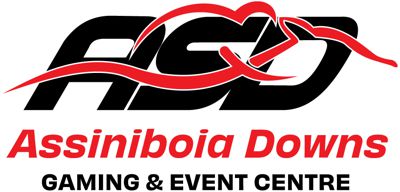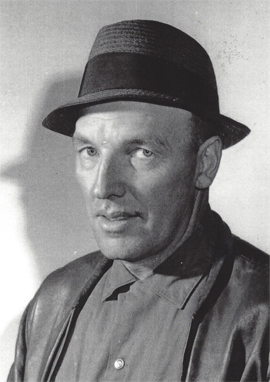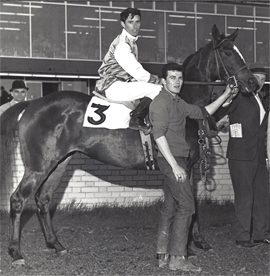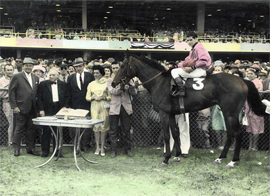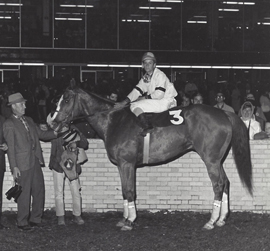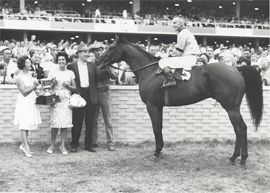by Bob
“He was a real gentleman.”
That’s how people who knew the man that trained horses and ran Jack Hardy’s JY Farm in St. Adolphe for the better part of 20 years, described George Victor Howell.
The Howell family hailed from Saskatchewan, but made their home in Calgary in the 1920s when George was a youngster. He spent his entire life around horses and learned the tricks of the trade from his blacksmith father, John. George wasted little time and immersed himself in the business of horses in the 1930s, first as a farrier or blacksmith and then as an owner/trainer of thoroughbreds.
George met and married the love of his life, Kathleen, in Calgary. The transition to trainer in the early 1940s was a natural one and greatly eased the physical demands that blacksmithing put on his back. In 1947, the Howells and their two children, son Murray and daughter Denise, pulled up stakes to make their home in Winnipeg.
George raced on the old prairie racing circuit in the 1940s and ’50s, which at the time included Whittier Park and Polo Park, but it was his association with National Motors’ Jack Hardy that would have the biggest impact on his life.
In the mid-1950s, Jack Hardy and his wife Yvette chose George to be JY Farms’ trainer at Polo Park race track until its closure in 1956. George also did some training for Jim Speers’ Whittier Park Stock Farm at Polo Park.
How fortuitous was it for George Howell that Jack Hardy would pick up the pieces of what was left of the Manitoba horse racing scene, and put them back together in the form of the new Assiniboia Downs in 1958.
And so George Howell’s two decades of training for the owner of the new Assiniboia Downs began! His affiliation with Hardy was huge, and Howell was a well-known and respected horseman who would make the most of the opportunity.
George knew most everyone, and those he didn’t, he would come to know. In addition to the likes of Jim Speers and Duke Campbell, George’s racing contacts included racing icon E. P. Taylor!
George wasn’t the only Howell to make an impact on the Downs in its infancy. His brother Harold, also from Calgary, was an excellent horseman who operated a stable here. Although neither man ever won a training title at the Downs, they were a dominant force in the trainer standings until Harold chose to stay out west after the local meet in 1964.
Harold and George were accomplished farriers, but birds of a feather? Not so much! George was a quiet, straight-laced man. Harold was the polar opposite! I’m told by George’s son, Murray that his uncle Harold was quite a character who lived to the ripe old age of 93.
Harold attributed his longevity to “race track hot dogs and cheap whiskey!”
It’s easy to forget that the horse racing business is more than just a summer race meet run at our west-end track from May to September. For George Howell, it was a year-round business venture that saw him race all over North America at tracks including Greenwood, Fort Erie, Woodbine, Blue Bonnets, Gulfstream, Ak-Sar-Ben, Sunshine Park and Raceway Park, among others.
There’s no doubt that at times the horse training/traveling business was a strain on the family, but the Howells always rose to the challenges. George’s son Murray explained that his father was often gone for months at a time, and this led to him having a special relationship with his mother.
Who knew?
- George was well-known for his signature fedora and the huge set of binoculars that he always carried.
- In 1960 a young Bill Teske would get his start in the business under George Howell at JY Farms.
- Howell trained 1961 Manitoba Derby winner Windspray, for E. P. Taylor.
- Champion Ruling Lark, owned by Paddock Restaurant’s Parry Orestes in partnership with Morris Kaplan, won both the Osiris Plate and the Winnipeg Futurity in 1968 and was described by Howell as the best 2-year-old he ever trained.
- Howell trained Jack Hardy’s Bocage, winner of the 1960 Manitoba Derby, a race that Hardy had brought back from the dead 20 years after it was last run in 1940.
- And who could forget Howell’s Mays Relic, winner of the 1967 Speers Handicap. Relic also won the Inaugural Handicap in 1967 and again in 1970 at the age of nine!
- Lastly, remember Scotty Kennedy’s 37-cent horse, Omar’s Gift? Well, Omar’s Gift passed away at the age of 22 at the JY Farm. Omar’s Gift’s first foal was Victory Gift, the filly who won the 1948 Canadian Derby. Victory Gift would in turn have a foal of her own, a nice colt by the name of Bocage, the winner of the 1960 Manitoba Derby. Talk about your basic six degrees of separation!
George Howell was a man of integrity who was easy to like, and he had an uncanny ability to get a horse to peak at the right time. There was no better example of this than Bala Roman, who won the 1963 Gold Cup by a neck over Already Dia, missing the track record by a mere fifth of a second.
George was also known for his candor. When a horse of his got beat and there was no valid reason for the loss, he would simply say, “we were just outrun.” A breath of fresh air from a true professional in an industry where excuses are often the norm.
On July 14, 1969 George Howell registered his 100th win at the Downs. To mark the occasion, Jack Hardy, President of Assiniboia Downs, presented Howell with a silver tray. The horse who won the race in question was none other than 8-year-old chestnut gelding Mays Relic!
The absence of official statistics makes the calculation of George’s lifetime wins difficult, but I can say that at the end of 1969 he was in second place on the Downs’ all-time leading trainer list – behind only the legendary Bob Watt. This despite never having won a leading trainer title!
George Howell officially retired from training in 1975, but he stayed on in St. Adolfe in 1976 to manage the affairs of JY Farm. In 1977 George would take on the role of Steward for the Manitoba Horse Racing Commission, a position he would hold until his death in 1982.
In February 1982, lung cancer claimed George Howell at the age of 67. His knowledge of the horse racing business was as thorough as it comes, from blacksmith to owner/trainer and farm manager and everywhere in between!
George loved what he did and whether he realized it or not, he had a profound impact on the lives of the many people who worked for and with him. Our racing history here at Assiniboia Downs is richer because of George Victor Howell, the son of a blacksmith…
who spent almost two decades training for the house!
